Team May 27, 2024 No Comments

You want to become a data engineer? That’s a smart choice because data engineers are in high demand right now.
And they earn impressive salaries. In fact, the average annual salary for a data engineer is ₹11,00,000 in India (Glassdoor).
But how do you break into this promising field? Well, you need a solid foundation. And that starts with an effective, up-to-date data engineering syllabus.
The syllabus is the roadmap that guides you through the essential skills and knowledge you need to land your dream job. Since technology is rapidly evolving, you need a relevant curriculum that focuses on the latest tools, techniques, and best practices.
In this blog post, we will explore the latest data engineering course syllabus. This will help you understand what you need to study and what skills you should develop in 2024 to step into this promising career path.
Data engineering is the field of study that involves building and maintaining data systems that collect, store, and manage data in an organization. This field is a mix of software engineering, database administration, and data science skills.
Data engineers ensure that the right data flows seamlessly from various sources into a centralized location like a data warehouse. This becomes possible because of the designing and implementing of data pipelines that extract, transform, and load (ETL) data from databases, APIs, sensors, and other sources.
Data engineers are also responsible for ensuring the quality and reliability of data. This involves cleaning and validating data, handling missing values, and addressing inconsistencies. They also implement data governance policies to ensure data privacy, security, and compliance with regulations.
Data engineers work closely with data scientists and analysts to understand their needs and design data models that are optimized for analysis and reporting. They may also develop custom tools and applications to streamline data workflows and automate repetitive tasks.
This way, data engineers play a crucial role in helping organizations utilize the power of data and gain a competitive edge in today’s fast-changing market. Now that you understand the basics of data engineering, let’s move on to the next section…
Here is the latest data engineering course syllabus. It is divided into four major sections focusing on four primary topics- SQL, Python, Big Data Processing, and Azure Cloud Engineering.
The following industry-relevant syllabus is strictly followed in the Data Engineering Certification course by Ivy Pro School, which is made in partnership with E&ICT Academy IIT, Guwahati.
If you want to learn data engineering and gain practical skills, you can join the course. It’s a live online program, so you can learn from anywhere. We will talk more about the course later. Let’s see the syllabus first:
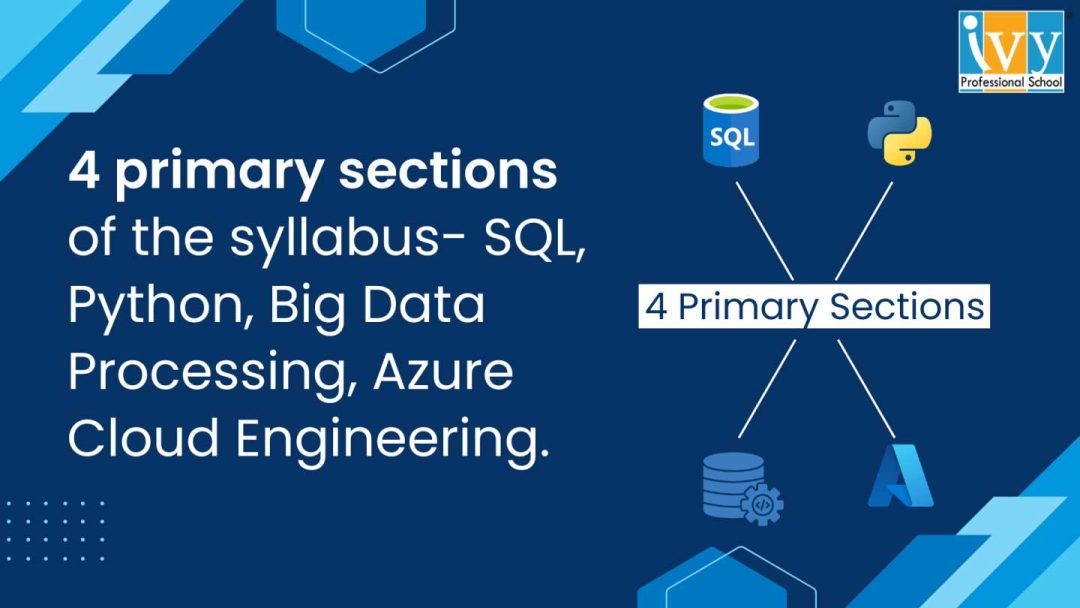
Here’s an overview of the SQL for Data Engineering section:
This section of the data engineering syllabus provides students with a comprehensive understanding of SQL, from basic to advanced levels.
It begins with foundational SQL queries, including SELECT statements, filtering, and sorting data. Students also learn to clean and modify data, covering essential operations like updating, transforming, and deleting data while handling errors and validating results.
The course then progresses to more complex topics such as data aggregation, advanced data filtering with pattern matching, and the use of window functions.
Next, students explore working with multiple data tables through various JOIN operations and conditional logic with CASE statements.
Advanced topics include creating and managing databases with DDL statements and developing user-defined functions and stored procedures to automate SQL operations.
Throughout the section, students engage in hands-on exercises and case studies using real-world datasets from industries like eCommerce and retail to apply their SQL skills.
Here’s an overview of what happens in the Python Essentials for Data Engineering section:
The second section of the data engineering syllabus introduces students to Python programming, with a focus on its application in data engineering tasks. Starting with the basics, students learn about Python’s data types, variables, and basic operations.
The course then steps into data structures such as lists, dictionaries, and tuples and shows how to manipulate them using Python’s powerful libraries, particularly Pandas. Students are taught to write and use functions and modules, enabling them to create reusable code.
A significant part of the section is dedicated to data wrangling with Pandas, where learners practice creating, cleaning, transforming, and aggregating data within DataFrames.
Additionally, the course covers API interactions, allowing students to fetch and process data from web APIs and database connectivity using SQLAlchemy to perform CRUD operations.
Error handling and debugging are also emphasized, ensuring students can identify and resolve common issues. And finally, hands-on projects throughout the section help solidify these skills.
Here’s what happens in the third section of the data engineering syllabus:
The Big Data Processing section offers a comprehensive overview of big data technologies and their applications in data engineering. The course begins with an introduction to the fundamental concepts of big data and explores key technologies such as Hadoop, Apache Hive, and Apache Spark.
Then, students learn about the Hadoop ecosystem, including HDFS and MapReduce, and gain practical experience in data storage and processing using Hadoop.
The course then covers Apache Hive, teaching students to query large datasets using HiveQL and apply these skills in hands-on projects.
Apache Spark is introduced next, with a focus on its architecture, RDDs, and DataFrames, and students learn to process data in real-time using Spark. The section also addresses data ingestion and storage techniques, highlighting the use of NoSQL databases like MongoDB.
In the final section, students explore real-time data processing with Kafka and its integration with Spark. They complete practical projects that emphasize building and managing real-time data pipelines.
Here’s what happens in this fourth and final section of the data engineering syllabus:
The Azure Cloud Engineering section provides an in-depth understanding of Microsoft Azure and its application in data engineering.
Students begin with the fundamentals of Azure, including an overview of its services, infrastructure, and security concepts such as Azure Active Directory and role-based access control.
The course covers the creation and management of Azure virtual machines, along with the use of Azure storage services like Blob, Queue, and Table for efficient data storage and retrieval.
Advanced topics include building end-to-end data pipelines with Azure Data Factory, which involves data movement, transformation, and integration, and an introduction to Azure Databricks for collaborative data processing.
Real-time data streaming is also covered, focusing on Azure Event Hubs and its integration with Azure Data Factory.
The section addresses hybrid cloud scenarios, teaches students to manage data workloads across on-premises and multi-cloud environments, and emphasizes governance and compliance standards.
Practical, hands-on projects throughout the section ensure students learn to apply their knowledge in real-world settings.
If you want to become a skilled data engineer, you can join Ivy’s certification course. This course follows the exact same data engineering syllabus as above and is developed in partnership with the prestigious E&ICT Academy IIT Guwahati.
Here is why you should choose Ivy’s Cloud Data Engineering course?
The course helps you become job-ready in just 45 weeks. Interested in learning more? Visit our Data Engineering course page for a detailed syllabus and enrollment information.
Is data engineering more difficult than data science?
It depends on your skills, experience, and strengths. Data engineering requires strong programming skills to build data pipelines, handle large amounts of data, and ensure data quality. Data science requires proficiency in statistics, machine learning, data visualization, and communication to find valuable insights from data and convey them easily. You can research and network with professionals in both domains to gain a better understanding.
Can you be a data engineer without coding?
No, you can’t become a skilled data engineer without strong coding skills. Your job as a data engineer involves building data extraction, transformation, and loading systems, working with data pipelines, managing data, and debugging and troubleshooting data systems. All of these require programming skills. That’s why Ivy Pro’s IIT-certified Data Engineering course teaches all the essential coding languages for data engineers.
Which coding languages are best for data engineers?
Python, SQL, Java, R, and Scala are some of the top programming languages used by data engineers. You will also need proficiency in tools like Apache Spark, Hadoop, and ETL frameworks. No matter which language you use, you will need a good understanding of data structures and algorithms.
Is Python enough for a data engineer?
No, Python is not enough. Python is an essential language for data engineers, and it can help you with data manipulation and data analysis. However, you will also need to learn data warehousing concepts, SQL, big data technologies like Hadoop, Spark, and Hive, and cloud platforms like AWS.
Is Java good for data engineering?
Yes, Java is a good language for data engineering. Since it’s an object-oriented programming language, it helps you write code that is easy to read, reuse, and maintain, helping you easily build complex data systems. Besides, Java has excellent performance, wide adoption, numerous libraries, and a supportive community.

Prateek Agrawal is the founder and director of Ivy Professional School. He is ranked among the top 20 analytics and data science academicians in India. With over 16 years of experience in consulting and analytics, Prateek has advised more than 50 leading companies worldwide and taught over 7,000 students from top universities like IIT Kharagpur, IIM Kolkata, IIT Delhi, and others.
Team May 24, 2024 No Comments

Everyone is talking about generative AI applications these days. This branch of artificial intelligence has surprised us all with its ability to talk and act like humans.
Generative AI has great potential to change the world. It’s already transforming fields like marketing, entertainment, and software development.
From automating repetitive tasks to becoming a smart personal assistant, generative AI is set to impact our lives in ways we can’t even fully imagine yet.
No surprise, the global generative AI market is expected to grow from 45 billion USD in 2023 to 207 billion USD in 2030. That’s a huge growth.
In this blog post, we will discuss nine innovative applications of generative AI. This will help you understand how this technology can change your life and the world around you, helping you stay updated with the technology.
Generative AI is a branch of artificial intelligence that can generate original text, code, images, audio, or even videos. Some of the most common generative AI tools are ChatGPT and Gemini for text generation, Dall-E2 for image generation, GitHub Copilot for code generation, etc.
But how does it work? Well, generative AI uses complex algorithms to learn patterns and structures from big datasets of human-created content. It then uses this knowledge to generate original content that’s similar to the data it was trained on.
This technology is already making waves. A recent study by McKinsey estimates that generative AI could add trillions of dollars in value to the global economy.
Companies are already using it to automate tasks, improve customer experiences, and even develop new products and services. In fact, the Financial Times found that 92% of Fortune 500 companies are building on OpenAI’s API. That’s insane, right?
Generative AI is helping us simplify complex processes, improve productivity, increase business efficiency, supercharge human creativity, and save huge costs. Actually, Gartner says businesses that will adopt GenAI can save 15.7% on costs.
Here are some remarkable applications and use cases of generative AI. As this technology continues to evolve, we can expect even more groundbreaking applications in the years to come.
Generative AI proves to be a good tool when it comes to sparking creativity and fueling strategic thinking. It can help you find ideas related to products, marketing content, business models, or even artistic works like novel writing. This helps us beat creative blocks and think out of the box effortlessly.
Similarly, generative AI helps us develop strategies to achieve goals. For instance, it can generate strategies for advertising campaigns, financial investment, content marketing, or even preparation for an exam.
Generative AI makes writing easier and faster. It can help writers brainstorm topics, structure their thoughts, create outlines, and prepare the first draft.
From blog posts, articles, product descriptions, sales copy, and social media posts to emails, AI can adapt to various writing styles and formats. This generative AI application is the reason why 73% of marketers are using GenAI tools.
What’s more, generative AI can also help writers refine their work by providing feedback on grammar, style, and tone. It can even suggest relevant sources and citations, ensuring that writing is well-researched and credible. This way, you can create high-quality content effortlessly.
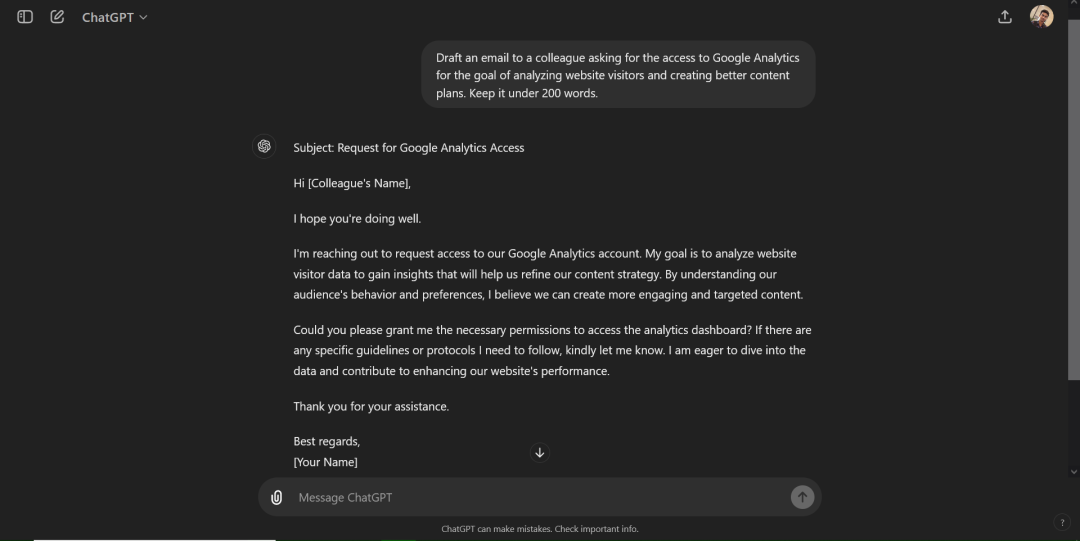
Generative AI can summarize complex information into easily digestible formats. You can use this technology to condense research papers, articles, PDFs, or even entire books into key takeaways.
It can identify important themes, extract insights, and generate summaries for specific audiences. This GenAI application can be useful for students, researchers, employees, or anyone who needs to quickly understand what’s written in a document.
GenAI tools like the recently launched GPT-4o model can also handle audio and video modes. It can summarize lectures, podcasts, or meeting recordings. This type of automation boosts productivity and helps us do more in less time.
Generative AI is a great coding companion. It can suggest code snippets, complete functions, and even generate entire codes. They can understand a developer’s needs and provide relevant suggestions to make coding faster.
Generative AI also helps software engineers identify bugs and simplify the debugging process. This can save developers countless hours of frustration. For instance, GitHub Copilot is a generative AI tool that makes coding 55% faster.
Besides, generative AI can be used to analyze and improve code quality, identifying potential performance bottlenecks or security vulnerabilities. This helps developers better focus on creative problem-solving and build robust software.
This is one of the most remarkable applications of generative AI. The technology can create detailed, realistic, and high-quality images based on text prompts given by the user. Some of the best tools for this are Dall-E2 and Midjourney.
Generative AI can also enhance existing images by improving their quality, increasing resolution, and transforming them into 3D shapes. This technology is proving invaluable in fields like medicine, where AI can enhance medical scans to aid in diagnosis, and architecture, where it can generate 3D models from 2D blueprints.

This is another impressive application of GenAI. Now, you can create professional videos using text prompts without technical expertise or expensive equipment. OpenAI’s revolutionary tool, Sora, has made this sci-fi concept a reality.
This will help marketing teams generate engaging video content to increase brand awareness, educators create explainer videos to simplify concepts, or filmmakers produce detailed scenes to improve storytelling.
GenAI can also enhance existing footage, improve resolution, remove noise, and even add special effects.
Generative AI is making language translation easier than ever before. Trained on tons of text in different languages, these AI models can translate words and sentences with amazing accuracy.
This generative AI application helps businesses, travelers, creators, and anyone who wants to connect with a global audience. For instance, companies can easily translate their marketing messages for different countries, reaching more people worldwide.
Generative AI can also help people have conversations in real time, even if they don’t speak the same language. This way, you can connect with the whole world without any language barriers.
Generative AI also automates certain parts of data analysis. It can analyze massive datasets, spot patterns and connections, and find useful insights that help businesses make smart decisions.
For instance, in finances, generative AI can analyze market data and help investors find good opportunities or predict how the market will perform. In healthcare, it can study patient records to figure out who might be at risk for certain diseases or create personalized treatment plans.
This is an interesting use case of generative AI. It powers conversational interfaces that let us converse with machines. The most common examples are chatbots and AI assistants that can talk just like humans.
These intelligent conversational interfaces can understand our needs, give personalized answers, and make interactions feel more personal and engaging.
Businesses are using this technology to support customers 24/7. Chatbots integrated into websites can answer FAQs, collect leads, promote products, and increase sales.
No wonder the conversational AI market is expected to grow from 10.6 billion USD in 2024 to 44.4 billion USD by 2031.
If you want to learn the ins and outs of Generative AI and build useful apps, check out Ivy’s Generative AI Certification course.
We have partnered with the prestigious E&ICT Academy at IIT Guwahati, so you will be learning from IIT professors and experts who have worked at top companies like Amazon, Google, and Microsoft.
You will go from the basics, like generative AI applications, to advanced skills, like machine learning, deep learning, Langchain, RAG, Transformer, and LLM.
But this 45-week course goes beyond the theory. You will get hands-on experience through 20+ real-life projects that deal with real-world problems. By the end, you will have a portfolio that showcases your skills to potential employers.
Visit this page to learn more about the GenAI course and see how you can join the next generation of AI innovators.
Team May 23, 2024 No Comments
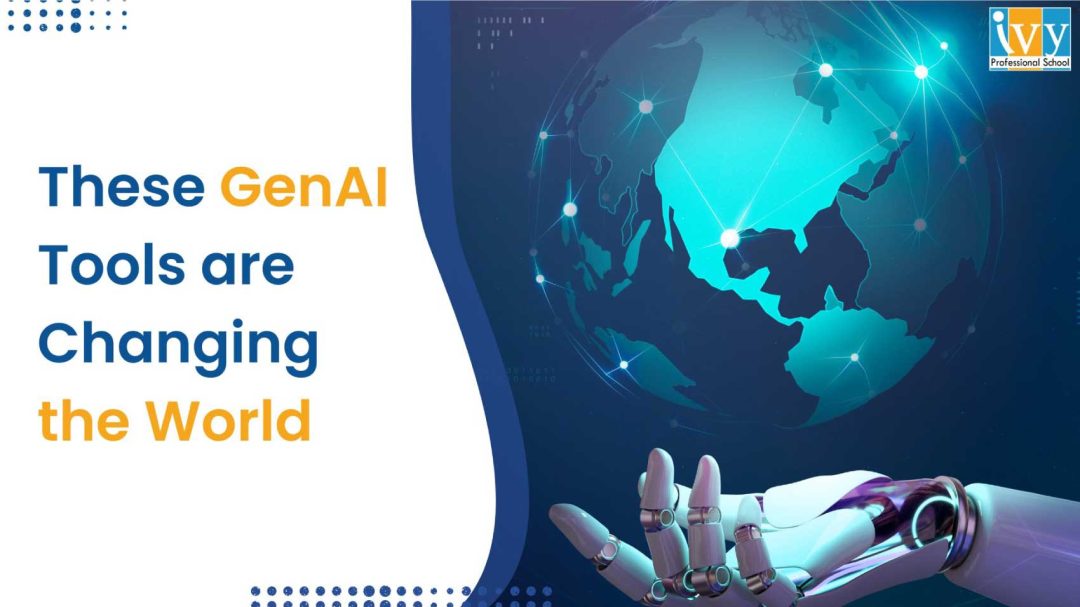
Ever since OpenAI launched ChatGPT, generative AI (GenAI) has taken the internet by storm.
But this is just the beginning of something big. GenAI is going to change how we work and live our lives.
For example, recently, OpenAI launched its most advanced model, GPT-4o, which can converse just like human beings. Isn’t that amazing?
The world is moving fast, and staying updated is the key. That’s why you should utilize the generative AI tools. Whether you are an artist, a software engineer, or just someone who wants to get more done, these tools can help you generate ideas, save time, and stay ahead of the curve.
In this blog post, we will explore 7 of the best generative AI tools available today. These tools will surely boost your creativity and productivity.
Generative AI is a field of artificial intelligence that can create new content by learning patterns from existing data. This includes generating text, images, music, code, or even video based on user prompts.
GenAI tools are like smart assistants that can help you automate repetitive tasks, find ideas, and boost your productivity. Here are 7 of the coolest GenAI tools that will help you unleash your inner genius:
You already know this GenAI tool. ChatGPT is the revolutionary chatbot built by OpenAI that basically started the AI boom. Powered by natural language processing (NLP), this tool can generate human-like responses to user prompts.
You can use ChatGPT to research a topic, create written content, generate and debug codes, find creative ideas, etc.
Currently, ChatGPT is powered by the latest GPT-4o model, which enables it to process and respond to text, audio, and graphics. That means you can upload a PDF file to ChatGPT and ask it to summarize the file.
ChatGPT bots are also used in websites to handle inquiries from website visitors and provide support to a company’s customers.
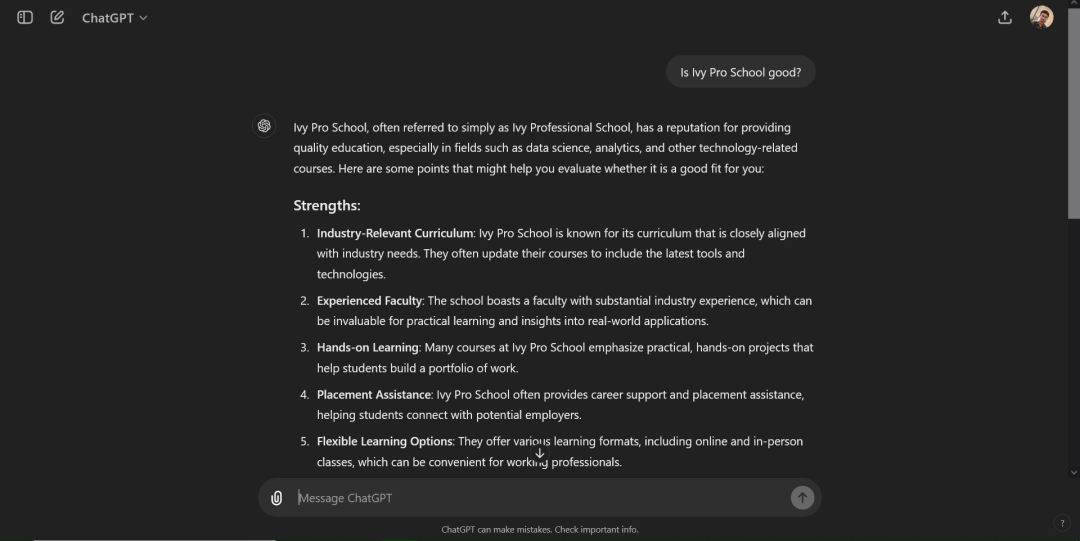
This is again another AI tool developed by OpenAI. Originally launched in January 2021, Dall-E2 is the second version that generates higher-quality and more detailed images.
This tool can create realistic images and visual arts based on user prompts given in natural language. The clearer you describe the image you need, the more accurate Dall-E2 will create the image, combining concepts, attributes, and styles.
This advanced GenAI tool can create different types of visuals like abstract art, realistic scenes, and imaginative scenarios.
You can also use this tool to produce multiple variations of an image based on the same text description. This way, you can edit and replace specific parts of an image using new text prompts.
This is an AI-powered code completion tool developed by GitHub in collaboration with OpenAI.
If you are a software developer or data engineer, GitHub Copilot can help you by suggesting code snippets, completing code blocks, and providing personalized coding assistance. It also applies directly to integrated development environments (IDEs) like Visual Studio, Neovim, JetBrains, etc.
GitHub says the tool can make coding 55% faster. This way, it increases the productivity of developers by reducing the time required to build software. This tool can help you write high-quality code that adheres to best practices and fulfills the requirements.
This is the latest Generative AI tool in this list, launched in February 2024. And yes, this is developed by OpenAI.
Sora can create high-quality, realistic videos based on text prompts. This tool can be used in entertainment, advertising, education, and potentially scientific simulations.
OpenAI has made this tool by teaching AI to understand and simulate the physical world in motion. Currently, Sora can generate high-quality videos that are up to a minute long and accurately follow the users’ prompts.
You can use this Generative AI tool to create cinematic scenes with multiple characters and give them accurate details. Since the model understands how things exist in the physical world, it generates realistic videos.
Although OpenAI is carrying out more research and improvement on Sora, it shows how AI will impact the future.
Midjourney is another excellent text-to-image generator. Developed by a small, self-funded team, it was launched in July 2022.
Similar to Dall-E2, Midjourney lets you input descriptive text prompts and generate corresponding images. However, compared to other image generation tools, Midjourney can increase the file size to 2048 x 2048 or 4096 x 4096 pixels, putting greater detail and clarity to the generated images.
Besides, this advanced GenAI tool is found to be better when it comes to queries related to illustrations, surrealism, and digital art.
Midjourney has a user-friendly interface that lets you create professional graphics even if you don’t have any technical expertise. And the Midjourney community keeps sharing their creations, tips, and experiences, which helps you learn and find inspiration.
Gemini is a GenAI chatbot developed by Google DeepMind. It lets you input your prompt in the form of text, image, or audio and get outputs in text and image modes. You can also ask to read aloud the output, which seems like talking to the AI.
Similar to ChatGPT, you can use Gemini for research, idea generation, content creation, language translation, etc.
Recently, Google launched Gemini 1.5 Pro, which can handle long-context information and process up to 1 million tokens. This enables the model to process bulky content such as hours of audio or video, large codebases, and lengthy documents.
This generative AI tool can help you understand, explain, and generate high-quality code in popular programming languages like Python, Java, C++, and Go. It has performed exceptionally well on coding benchmarks like HumanEval and Natural2Code.
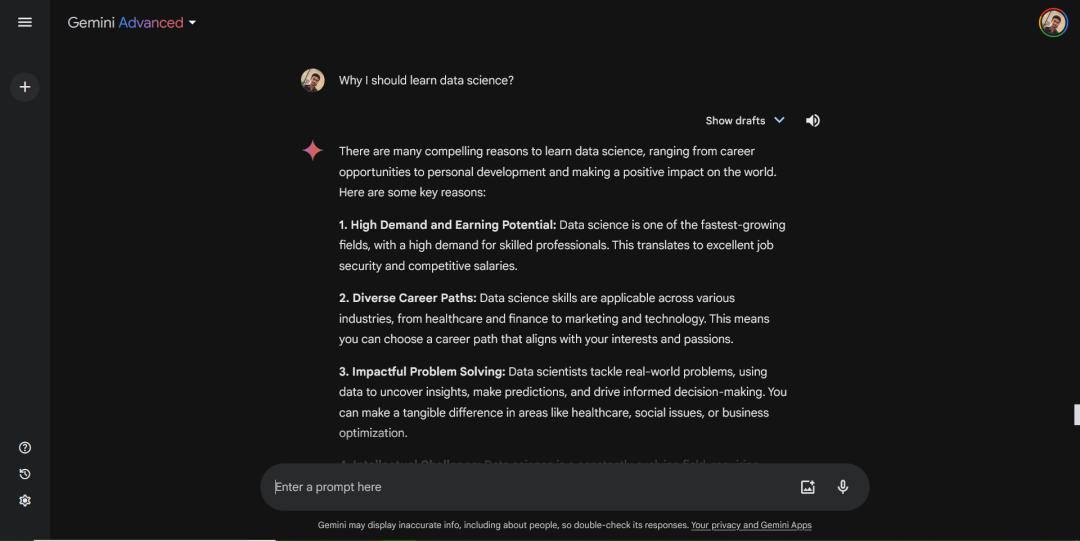
AlphaCode is another GenAI tool developed by DeepMind. It generates code and solves challenges for programmers.
It can understand the requirements of a problem, develop an approach, and then write the code that meets the requirement.
In tests conducted on Codeforces, AlphaCode ranked within the top 54% of participants. This shows the ability of this tool to handle complex coding tasks.
The tool knows critical thinking, logic, algorithms, coding, and natural language, so it can solve problems just like a human coder.
You can integrate it with popular IDEs through a plugin and get real-time code suggestions and debugging assistance that enhances code efficiency and quality.
So, these are some of the amazing generative AI tools that exist today. As these tools continue to develop, they are sure to revolutionize how we approach creativity and problem-solving.
If you want to learn GenAI and leverage it to build useful apps, you can join Ivy’s GenAI Certification course.
This course is made in partnership with E&ICT Academy, IIT Guwahati. You will be coached by IIT professors and experts from Amazon, Google, Microsoft, etc.
The course has an industry-focused curriculum that will help you learn advanced Generative AI tools and skills like machine learning, deep learning, Langchain, RAG, Transformer, and LLM.
You will also complete 20+ real-life projects, learn to solve real-world problems, and build a compelling portfolio.
All these can help you land your dream job in MNCs and get impressive salaries. Visit this page to learn more about Ivy’s GenAI course.
Team May 17, 2024 No Comments

Education is the most powerful weapon which you can use to change the world, said the revered South African activist Nelson Mandela.
We at Ivy believe in the power of education. That’s why we have been helping students learn valuable and impactful skills for the last 16 years.
Today, we have over 29,000 alumni spread across 400+ organizations. And nothing makes us happier than seeing them work in leading positions in companies like Amazon, Samsung, McKinsey & Company, Honeywell, etc.
In this post, we will tell why you should choose Ivy Professional School and what our alumni say about us.
We at Ivy help you upskill with our advanced courses on data science, cloud engineering, and Gen AI. These online courses help you learn high-value skills, complete real-life projects, prepare for interviews, and secure your dream job in MNCs. Here are some of the things that make us one of the best at what we do:
Our courses focus on industry-relevant syllabus and in-demand tools. This helps you learn the right skills to solve practical business problems effectively. And the structured curriculum makes learning easy.
For example, in our Data Engineering Certification course, you will master the necessary tools like SQL, Azure, Hive, MongoDB, Spark, Kafka, and Hadoop.
But theory alone is incomplete. That’s why our courses also help you gain practical experience. We let you complete projects and case studies solving real-world problems. This not only solidifies your knowledge but also helps you build a stunning portfolio that showcases your skills to hiring managers.
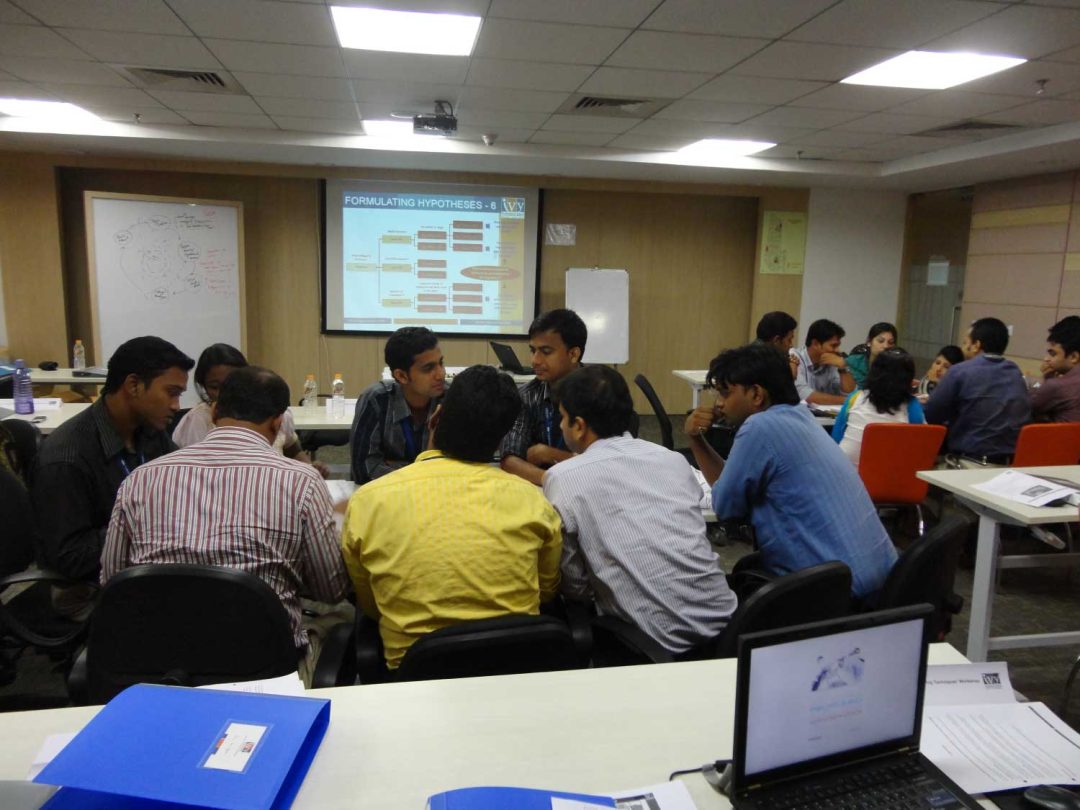
The most important element of any educational program is the mentors. They determine what and how students learn. That’s why Ivy always focuses on bringing the best mentors to train our students.
Ivy’s faculty is highly qualified and has years of teaching experience. They gained education from prestigious institutions like Texas A&M University (USA), IIT Bombay, IIT Delhi, etc.
Ivy has 400+ elite industry-experienced mentors from reputed institutions like IIT, IIM, ISI, and some US Universities. Our students are also coached by experts from giants like Amazon, Accenture, Google, Microsoft, etc.
We want to make learning as easy as possible. That’s why we have hybrid delivery for our courses. For offline, we have our learning centers in Kolkata, New Delhi, Pune, Bangalore, and Mumbai. And in online mode, you can attend the courses from anywhere in the world with an internet connection and a laptop.
We also understand that working professionals have busy work schedules. That’s why our classes are strategically scheduled on weekends. So, if you are a working professional, you can easily upskill in your free time while having a secure job. Besides, we provide you with recording access for lifetime revision.

Technology is a beautiful thing. It makes teaching really smooth and effective. That’s why we employ advanced technology in our classroom. We have modern infrastructure, including high-tech lecture labs with a 1:1 student-to-laptop ratio and video conference aids.
We also ensure that our class size is kept small so that we can deliver quality teaching. Besides, the onsite library and web-based e-library with a Learning Management System for students help them get the most out of our courses.
Ivy also provides you with live doubt-clearing sessions to help you find instant answers to your doubts. This way, you won’t have to waste time searching for answers– our mentors will be there to help, 24×7, 365 days.
Ivy Professional School is the official learning partner of Fortune 1000 companies. This includes companies like Tesco, Genpact, Honeywell, Tata Steel, Atlas Copco, Accenture, ITC Limited, ICRA, ITC Infotech, Capgemini, HSBC, Cognizant, etc. They directly recruit the students trained by us, which speaks volumes about our high-quality and industry-relevant teaching.

Our courses are accredited by NASSCOM and Govt. of India (MEITY). Our courses are compiled as per National Occupation Standards. Besides, we collaborate with reputed organizations like E&ICT Academy IIT Guwahati and IBM to provide our students with the best quality teaching. These credible names make the course certificate valuable, helping our students stand out.
We at Ivy have designed and delivered 2500+ specialized courses in various topics like AI, Data Science, Data Engineering, Analytics, Big Data, ERP, Organizational Behavior, Foreign Language competencies, etc.
Ivy has been a top-ranked data science, data analytics, and AI upskilling provider since 2008. We have trained over 29,000+ professionals spread across 400+ organizations who are shaping the technology revolution worldwide.
Today, you will find our alumni in companies like Honeywell, Tesco, Aramco, IBM, Genpact, Samsung, KPMG, Tata Steel, ITC Ltd., ICRA, Wipro, Dell, HSBC, Frost & Sullivan, Citibank, HDFC, Capgemini, Cognizant, etc.
Now, you won’t be surprised by the fact that our students rate 4.9 out of 5 on Google and Facebook. Here’s what our students say about us:
One of the best institute in the field of Data Analytics. The course content is comprehensive and hands on approach helped me to gain practical knowledge. All the teachers are highly supportive. The teaching quality specially Eeshani mam is commendable. The teaching assistants are very quick to respond and help the students. Glad to say with the help of entire IVY team, I made my career transition towards data field. Highly recommended to everyone.
-Subhajit Ganguly (Reviewed Ivy on Google)
Thank you, Ivy Professional School, for the invaluable guidance and referral provided during my journey as a Data Analyst and Management Reporting Executive at Adzguru. Highly recommended for anyone seeking top-notch education and career development in the field of data analytics!
-Subhadip Neogi (Reviewed Ivy on Google)
Ivy Pro School is the best institute where students can gain a lot more knowledge about data handling, coding, visualizations and perform them easily and effectively through the tools recommended in their course structure. Coming from non-coding background was very hard for me to understand the processing of data in different tools but thanks to the teachers who helped me a lot in clarifying my doubts and rectifying my errors in a clearer and easier way.
-Anwesha (Reviewed Ivy on Google)
Completing Excel and SQL modules at Ivy Pro School’s data analyst course enhanced my proficiency in data manipulation and querying. The structured curriculum and supportive instructors provided a solid foundation, empowering me to excel in data analysis. I highly recommend Ivy Pro School to anyone interested in data science or analytics.
-Anjali Singh (Reviewed Ivy on Google)
I’ve been studying Data Science at Ivy Pro School for six months. The course is comprehensive, diving deep into essential data science aspects. What distinguishes this course is its emphasis on practical application. We tackle real-world business problems, deriving actionable insights rather than just creating appealing visualizations. Based on my experience, I highly recommend Ivy Pro School to anyone interested in data science or analytics.
-Arka Santara (Reviewed Ivy on Google)
I did data analysis and visualization course from IVY. They have very detailed course syllabus. Very much recommended. The teachers are caring and do not rush to complete the course rather take time to match their pace of teaching to students’ level of understanding. The teaching assistants are also very quick to respond and help the students.
-Tanusree Mondal (Reviewed Ivy on Google)
Ivy Professional School has exceeded my expectations in every aspect. The dedication and expertise of Eeshani Ma’am and Prateek Sir are truly commendable. Their patience, effective delivery, and genuine care for students’ progress make learning a delightful experience. In addition to this, the student support staff, here, are incredibly approachable and helpful.
-Akanksha Bhual (Reviewed Ivy on Google)
Only 15 days in at Ivy Professional School Kolkata, and I’m loving it! The Excel batch with Eeshani Ma’am is exceptional. Her teaching makes even advanced concepts clear and engaging. If you’re looking to upskill in Excel or build a career in data analytics or data science, Ivy is a fantastic place to start.
-Shatadal Chakraborty (Reviewed Ivy on Google)
Being a botany student, moving towards data analysis is not easy but ivy pro school have made it way easier than expected. The best part in Ivy is its continuous support starting from professional trainers to doubt clearing to any other queries , they are always welcoming and they try their best to solve it as soon as possible….. so to all the newbies out there who are thinking of switching to data field trust me nothing can be better than IVY PRO SCHOOL……
-Saptati Bagal (Reviewed Ivy on Google)
Education makes you powerful. It helps you become capable of meeting your needs, fulfilling your dreams, and making a positive impact in the world. And Ivy wants to help you do that.
You can join our courses on data science, cloud data engineering, or Gen-AI and learn high-earning skills. Our beginner-friendly courses take you from foundational to advanced concepts in weeks while helping you gain practical experience.
So, if you want to land your dream job in top MNCs, explore our courses today.
Team May 15, 2024 No Comments

Data engineers collect, organize, and store raw data. This helps companies uncover valuable insights, improve their products, and better target their marketing. That’s why companies value data engineers.
But is data engineering a good career? Are data engineers in high demand?
There’s actually a high demand for skilled data engineers, and the job offers a competitive salary and good learning opportunities.
If you see the numbers, the global big data and data engineering market is projected to grow from USD 51.7 billion in 2022 to USD 140.80 billion in 2028. So, you can also expect good job security.
Keep reading to find out more. We will explore what data engineers do, why this career path is worth pursuing, and what the future of data engineering is. So, here we go…
Data engineers are the plumbers of the data world, building pipelines that collect data. They extract raw data from different sources and store it in a usable format.
Data engineering is all about making data available, consistent, secure, and recoverable for an organization. For this, they have to build and maintain infrastructures like databases, big data repositories, and data pipelines.
Here’s a breakdown of their key tasks:
As a data engineer, you will often collaborate with data analysts and scientists to ensure data matches their needs and the organization achieves its goals. And that’s how you will be playing a critical role in helping businesses make data-driven decisions.
Here are some key data engineering skills:
SQL: You need to learn SQL queries and operations like data cleaning, aggregation, and error handling, as well as advanced SQL features like subqueries and user-defined functions.
Python: Python programming is essential. You need to learn Python basics, advanced data structures, functions for data preprocessing, data wrangling, debugging, etc. Besides Python, you can also learn programming languages like Java, R, and Scala.
Data Warehouses: A data warehouse is a data management system that stores large amounts of data from various sources in an organized way. You need to know how to design, build, and manage it so that businesses can carry out their BI, analytics, and reporting smoothly.
ETL Pipelines: ETL stands for Extract, Transform, and Load. It helps businesses collect, store, and use data efficiently. This involves taking raw data from various sources, cleaning it up, and then loading it into a single system for further use.
Big Data Processing: This helps you work with large amounts of data. You need to learn the fundamentals of big data and key technologies such as Hadoop, Apache Hive, and Apache Spark. You can work on projects that involve building and managing real-time data pipelines.
AWS, Google Cloud, Microsoft Azure: Cloud services are used to store and manage data over the internet, so you don’t need physical servers. AWS, Google Cloud, and Azure are technologies that allow you to do this. Simply gaining an in-depth understanding of Microsoft Azure and its application in data engineering would be enough.
Read this post to know more about the latest data engineering syllabus and skills.
You also need to develop certain soft skills to work smoothly in the corporate world.
The most important is communication skills, which are necessary to clearly explain technical details to non-technical colleagues and stakeholders. Good communication also helps you better understand the problems of your clients and get relevant feedback to deliver the best work.
You also need attention to detail, problem-solving skills, presentation skills, and the ability to work well in a team.
And obviously, to get a job, you need to know how to perform well in interviews. That’s why we at Ivy Professional School help our students by letting them participate in mock interviews.
So, now you understand that data engineers build the foundation for data-driven decision-making for organizations and what skills they need to do it. But does that mean it’s a good career path for you?
Well, let’s see some of the reasons why data engineering is an attractive career path:
High Demand: Businesses have to deal with massive amounts of data. This creates a constant need for skilled data engineers to collect and manage it. That’s why, in April 2024, there were over 10,500 job openings for data engineers across all industries on online job portals in India.
Impressive Salaries: With high demand comes high pay. Data engineers typically earn competitive salaries because of the value they bring to organizations. The average base pay of data engineers in India is ₹9,41,500 per year. And senior data engineers with 2-4 years of experience have an annual average base pay of ₹18,50,000.
Learning Opportunity: Data engineering requires creativity and problem-solving. You will constantly be challenged to design new data pipelines, clean up raw data, and find innovative ways to make data usable. This means you will get to learn a lot of tech and soft skills.
Creating Impact: You will work on a variety of projects across different industries, making a real impact on how businesses operate and make decisions.
Job Security: According to IDC, the global datasphere is projected to reach a staggering 175 zettabytes by 2025. This ever-increasing data volume creates a constant demand for skilled data engineers. That’s why data engineer jobs are expected to grow at a rate of 21% from 2018-2028 in the US. This means you can have a stable and rewarding career.
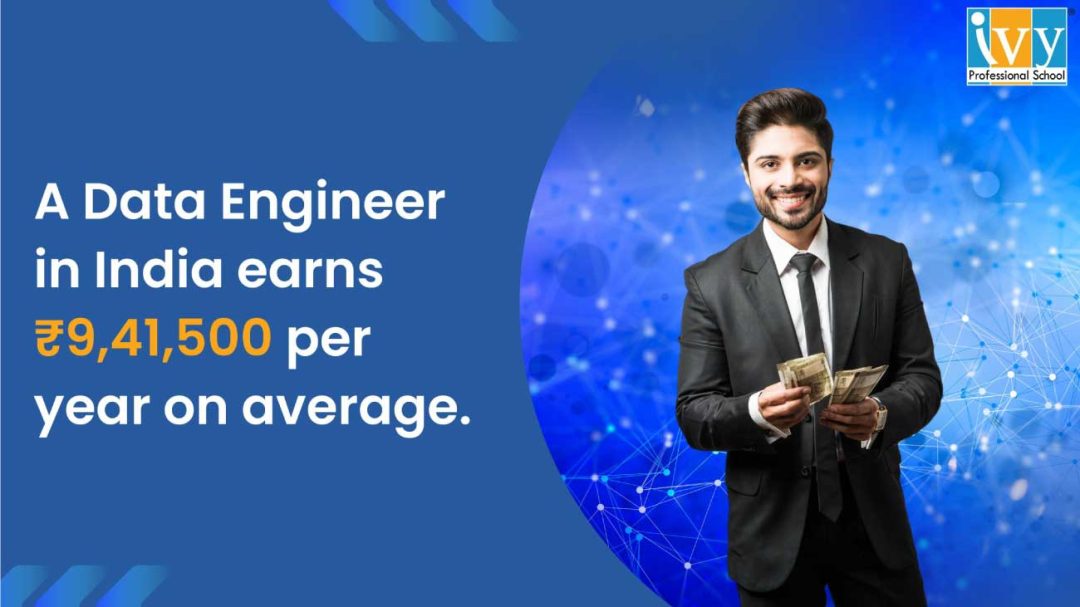
The above points make data engineering an irresistible career path. However, there are also certain challenges that you must take care of. Here they are:
Now, you will be able to judge if data engineering is for you or not. Let’s move on to the next section for an even better understanding…
First of all, it’s important to consider if this career aligns with your interests and skills.
If you like programming, are passionate about data, and love challenges, then the benefits of data engineering can outweigh the challenges.
However, you will need a learning attitude. The market is ever-changing, so a love for continuous learning is essential to stay relevant in this field.
You will also need communication and teamwork skills. Because data engineers often work with data scientists, analysts, and other professionals to help an organization achieve its goals.
If you match the above requirements, data engineering will be a rewarding career path for you that will offer good pay, job security, and the chance to make a real impact in the world.
The world of data is constantly growing. And you, as a data engineer, will continue to play a vital role in shaping its future. Here are some exciting trends to look forward to:
With the ever-growing importance of data, data engineers will be even more crucial for businesses of all sizes. If you are looking for a promising career, you can definitely consider data engineering.
If you want to learn data engineering, you can join Ivy’s Cloud Data Engineering Certification course.
This is an online course made in partnership with E&ICT Academy IIT Guwahati. So, you will be coached by IIT Guwahati professors as well as experts from Amazon, Google, Microsoft, etc.
The course will help you learn current industry skills, complete 30+ real-life projects, and become job-ready in just 45 weeks.
And this program is perfect for both college graduates as well as working professionals who want to upskill. Visit this page to learn more about Ivy’s Cloud Data Engineering course.
Is data engineering a good career in India?
Yes, data engineering is a promising career in India. With impressive salaries, job security, and a lot of learning opportunities, data engineering can help you achieve your career goals. And since the global big data and data engineering market is expected to grow from $51.7 billion in 2022 to $140.80 billion in 2028, you can expect the demand for data engineers will only grow with time.
Are data engineers in high demand?
Since data-driven decision-making has become a necessity, data engineers are in high demand. Companies across various industries need them to build and maintain the infrastructure needed for data collection, storage, processing, and analysis. That’s evident from the fact that data engineering jobs are expected to increase at a rate of 21% from 2018-2028 in the US.
Does data engineering involve a lot of coding?
Yes, data engineering involves a lot of coding. Data engineers use programming languages like Python, SQL, Scala, and Java to build data pipelines, manage databases, and make sure data is processed efficiently. If you want to be a skilled data engineer, you have to master the above programming languages, which you can easily do by taking online data engineering certification courses.
Do data engineers make good money?
The average salary for a data engineer in India is ₹8,53,500 per year. Location, industry, company size, and years of experience are some factors that can influence the salary. For instance, data engineers in Bangalore earn an average annual salary of ₹11 lakhs, and in Pune, it is ₹9 lakhs. But whatever the case, as the demand for data engineers continues to rise, salaries are expected to remain high.
Who gets paid more: software engineers or data engineers?
Both software engineers and data engineers are well-paid, but their salaries can vary based on factors like company, location, experience, etc. If you compare the average annual salary, data engineers earn ₹8,53,500, and software engineers earn ₹8,21,152, according to Glassdoor. So, data engineers can earn slightly more due to their specialized skills and the growing necessity of data-driven decision-making.
Is data engineering a stressful job?
The right answer depends on you and the company you will work at. However, like most technical jobs, data engineering can be challenging at times, especially when dealing with complex data systems or tight deadlines. The thing is, you have to ensure that data systems are efficient, reliable, and secure. Which can be stressful. But if you have mastered the skills, have good experience in solving data-related problems, and love programming, the work can be very rewarding.
Will AI replace data engineers?
Okay, that’s a hot question. AI can automate repetitive and laborious tasks like data ETL, data integration, data pipeline creation, etc. But it won’t fully replace data engineers. Skilled data engineers will be needed to perform those complex tasks requiring human expertise and creativity. So, keep improving your skills, stay updated with the industry, and learn to utilize AI. AI is your co-pilot, which can boost your efficiency and problem-solving ability.

Eeshani Agrawal holds an MS in Civil Engineering from Texas A&M University (USA) and has over 16 years of experience in data visualization, storytelling, and analytics. She has consulted for top engineering, manufacturing, and consulting firms worldwide and has coached over 9,000 professionals and students from leading institutions like IITs, IIMs, and ISI.
Team May 06, 2024 No Comments

Mastering data science requires constant learning. Books can help you learn new things, improve your techniques, and change how you approach problems.
No matter whether you are an aspiring data scientist or a professional, reading data science books lets you effectively transform raw data into powerful insights and tell better stories.
To help you on this journey, in this post, we have shared some of the best data science books you must read. So, get ready to become smarter and more skilled.
Here are some of the best books for data scientists that will help you sharpen your skills. They will improve your problem-solving ability and help you use data to make sense of this confusing world:
Author: Joel Grus is a research engineer at the Allen Institute for Artificial Intelligence. Formerly a software engineer at Google and a data scientist at numerous startups.
About: This is one of the best data science books for beginners that goes beyond using basic tools. The book covers data manipulation, machine learning models, and even advanced topics like recommendation systems and natural language processing. You will gain a strong foundation in the math and statistics behind data science, plus the coding skills to put it into practice.
Get the book: Data Science from Scratch
Authors: It’s written by famous data science experts Foster Provost and Tom Fawcett. Provost is a Professor of Data Science at New York University’s Stern School of Business. And Fawcett is a machine learning Ph.D. holder who has worked in industry R&D for over 20 years.
About: This book teaches you the core concepts of data science and how to apply them to solve real business problems. The book emphasizes “data-analytic thinking” to help you extract valuable insights from data. It’s ideal for those wanting to bridge the gap between data science and its practical business applications.
Get the book: Data Science for Business
Author: Wes McKinney is an American software developer, Co-founder of Voltron Data, and creator of the Python pandas project. He studied theoretical mathematics at MIT and graduated in 2006.
About: This data science book teaches you essential Python skills for working with data. You will learn data cleaning, manipulation, and analysis to effectively solve diverse sets of data analysis problems. This book is packed with practical case studies and is perfect if you are new to Python and want to get introduced to scientific computing in Python.
Get the book: Python for Data Analysis
Authors: It’s written by Peter Bruce and Andrew Bruce. Peter Bruce is the founder of the Institute for Statistics Education at Statistics.com. Andrew Bruce is a Ph.D. holder in statistics at the University of Washington and has 30+ years of experience in statistics and data science.
About: This book bridges the gap between traditional statistics and how it’s used in data science. It covers essential statistical methods, shows how to apply them correctly, and helps you avoid common mistakes. You will learn about exploratory analysis, sampling, experimental design, regression, classification, and even machine learning from a statistical viewpoint.
Get the book: Practical Statistics for Data Scientists
Author: Cole Nussbaumer Knaflic is the founder and CEO of Storytelling With Data. She has been analyzing data and telling compelling stories for the last 10 years.
About: “Storytelling with Data” is a must-read book for data scientists. It teaches you how to transform data into clear and compelling visuals that tell an informative story. You will learn the principles of effective data visualization and how to go beyond basic charts to create presentations that engage your audience. If you want to make your data analysis truly impactful, this book is for you.
Get the book: Storytelling with Data
Authors: It’s written by Hadley Wickham and Garrett Grolemund.
Hadley, renowned for his contributions to R, serves as chief scientist at Posit, PBC, and is an adjunct professor at the University of Auckland, Stanford, and Rice University.
Garrett, a Ph.D. holder in statistics from Rice University, serves as the director and developer relations at Posit, PBC.
About: This is a beginner-friendly guide suitable for people who have no previous programming experience. It teaches you R, RStudio, the tidyverse (a set of helpful packages), and the entire data science process. You will learn data cleaning, exploration, modeling, and how to present your results effectively. The book has a lot of exercises that will help you apply your knowledge to solve problems.
Get the book: R for Data Science
Authors: Andreas C. Müller and Sarah Guido wrote this data science book. Andreas Müller, PhD holder in machine learning from the University of Bonn, works at the Center for Data Science at the New York University. Sarah, a data scientist residing in New York City, worked in many startups.
About: This book is a practical guide to building machine-learning applications using Python. The book focuses less on the maths and more on the practical side of using ML algorithms, making it a beginner-friendly book. Apart from the Scikit-learn library, you will also get familiar with NumPy and Matplotlib libraries.
Get the book: Introduction to Machine Learning with Python
Author: Seth Stephens-Davidowitz is a data scientist, economist, and author. Formerly a Google data scientist and a visiting lecturer at the Wharton School of the University of Pennsylvania.
About: This is one of the best books for data scientists who want to understand the application of data science. “Everybody Lies” explores how big data can help us uncover hidden patterns about how people think and behave. The book teaches you to analyze large datasets to answer interesting questions about the world, covering topics like prejudice, decision-making, and even the impact of movies on crime. Aspiring data scientists will learn to think critically about data and see how it can be used to challenge common beliefs.
Get the book: Everybody Lies
Data science books are good for sharpening skills. But if you want to build a strong foundation and gain real-world experience, Ivy’s Data Science and AI certification course can help you.
This online course is made in partnership with E&ICT Academy IIT Guwahati, so you will be coached by IIT professors and will get an IIT-branded certificate upon completion of the course.
This online course will teach you in-demand skills like data analytics, ML, Gen AI, deep learning, etc., with tools like Adv Excel, SQL, Python, Power BI, VBA, Tensorflow, etc.
With 50+ real-life projects, live doubt-clearing sessions, and placement assistance for holistic growth, the course makes you job-ready in 45 weeks. Visit this page to learn more about Ivy’s Data Science and AI course.
Team May 03, 2024 No Comments

You got into an engineering college. But now, something doesn’t feel quite right. Maybe you don’t know what to do after BTech.
If that’s the case, you are not alone. Every year, 15 lakh students graduate with an engineering degree. Most are confused about career options after engineering. Since this is a major life decision, it’s common to feel somewhat uncertain and anxious.
The good news is there are many exciting career paths you can explore. This blog post shares five smart career options you can consider after your engineering. It will help you find a fulfilling and financially rewarding path.
That’s a big question. However, you can use the Japanese concept of Ikigai to figure out the right career option after BTech. You see, the exact meaning of Ikigai is “a reason to live.” And you have to find your Ikigai or the purpose of your life, for a fulfilling life.
Ikigai can be found in the intersection of these four areas:
Finding your Ikigai often takes time and a lot of self-reflection and exploration. Don’t expect to have all the answers right now.
So, keep looking for the answers to the above four questions while you go through the list of career options after engineering. The goal is to find a career that you are enthusiastic about, that you are good at, that lets you solve real-world problems, and that can help you make money.

Time to find out what to do after BTech in India. So, here we go…
This is a great way to launch your professional career. Companies come directly to your college looking for fresh talent. And since there isn’t much competition, you can easily secure a job offer before graduation.
Campus placement helps you learn skills, gain experience, and get better at solving real-world problems. Many companies even help you upskill with their training programs. So, you can consider it as a good learning opportunity.
How do you succeed at campus placement? Well, you have to take care of certain things.
Remember, even if you accept a campus placement offer, it doesn’t mean you are locked into that career path forever. It’s just the first step in your exploration of finding your Ikigai.
This is a smart career path after engineering. A certification course is a great way to separate yourself from the crowd. It helps you learn job-relevant skills in a shorter time and land high-paying jobs.
Here are some popular skills to consider:
So, first, you have to choose a field that makes you enthusiastic. For instance, if you like maths, programming, and problem-solving, you can choose the data science field. Data science employment is expected to grow 35 percent from 2022 to 2032, with around 17,700 openings each year, on average, over the decade.
Next, you can look for a good course from an established institution. For data science, Ivy Pro School’s Data Science and AI course is a good option. This course is made in partnership with E&ICT Academy IIT Guwahati and helps you master data science from the basics to advanced.
Also, a certification alone won’t guarantee a job. You will need practical experience through projects or internships. That’s why Ivy lets you complete dozens of projects to gain hands-on experience and build an impressive portfolio.
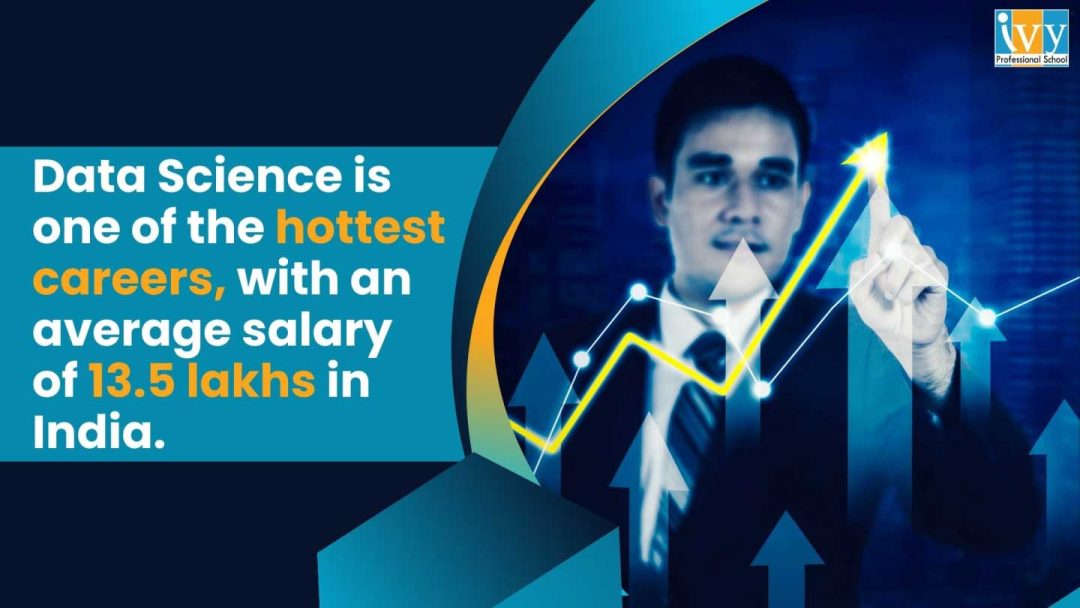
If you don’t like the traditional 9-5, you can explore this unconventional career option after BTech. It’s less risky than entrepreneurship and still lets you be your own boss.
In freelancing, you sell your services to individuals and businesses to help them solve certain problems. Some high-paying freelance services are data analysis, AI, copywriting, website development, graphic designing, etc.
Freelancing offers you a lot of freedom. It lets you set your own hours, choose your clients, and work from anywhere you like. You can focus on projects that genuinely interest you and build a niche based on your strengths.
Here’s the roadmap to becoming a high-earning freelancer:
Freelancing requires self-discipline and patience. You won’t have the security of regular paychecks. But it’s a great career path because of flexibility and control.
This career option after engineering can open many doors. GATE is a competitive exam in India that helps you with both higher education and jobs in the public sector.
For instance, a good GATE score can help you get admission for a Master’s Degree in prestigious institutions like the IITs or NITs. Gate score can also help you land well-paying, secure jobs in major PSUs and MNCs. GATE also lets you pursue a career in the research field with a stipend.
To prepare for the GATE exam, first understand the syllabus, exam pattern, and weightage of different topics in your chosen engineering discipline.
It’s a popular exam. So, you will easily find resources, including study materials, online courses, and coaching centers. Select those that best fit your learning style.
And you already know you have to practice mock tests and solve previous years’ question papers. The truth is GATE is a challenging exam, but rewards in terms of career and personal growth are worth all the effort.
If you love explaining concepts and helping others learn, teaching in a coaching institute could be a good career option after engineering.
You see, India has lakhs of coaching institutes preparing students for competitive exams like JEE, NEET, and others. So, you can easily get into one and teach one of the subjects like Physics, Chemistry, or Maths.
You will need in-depth knowledge of the subjects you plan to teach and stay updated on exam patterns. Also, you should know how to simplify complex concepts and help everyone in the classroom understand.
This way, you will share the knowledge and directly shape young minds, helping them crack competitive exams. Teaching in coaching institutes also improves your communication skills and helps you constantly learn and grow.
Data scientists are in high demand now. If you like maths and programming, this could be your Ikigai, the perfect career option after engineering.
You can join Ivy’s Data Science and AI Certification course. This online course can help you master data science in 45 weeks and land high-paying jobs in top MNCs. In this training, you will:
Ready to explore this promising career? Visit this page to learn more about Ivy’s Data Science and AI course.
Team Apr 29, 2024 No Comments

“What’s the data scientist’s salary in India?” Aspiring data scientists often ask this question.
You see, the data science field is constantly in demand. It combines coding, math, and business skills to uncover valuable insights from massive datasets and help businesses make smart decisions.
But if you are considering a career in this field, you might be curious how much it can pay you. After all, we all need strong reasons to jump into a career path.
In this blog post, you will know the salaries of data scientists in India and in major Indian cities. This will surely inspire you to learn and upskill to become an expert data scientist and get impressive paychecks.
And, if you actually want to learn data science, you can enroll in Ivy Pro School’s Data Science and AI Certification course in partnership with E&ICT Academy, IIT Guwahati. This solid online course will make you job-ready in just 45 weeks.
The salary of data scientists in India is affected by several factors. But before we get into the details, here’s a general figure:
Average Salary: The average salary of data scientists in India is ₹13.5 lakhs per year (Glassdoor). This salary varies within the range of ₹8 lakhs to ₹19 lakhs per year.
Starting Salary: The starting salary of data scientists in India with less than one year of experience is ₹6 lakhs per year, including tips, bonuses, and overtime pay (Payscale).
Early Career Salary: The average salary of data scientists with 1-4 years of experience is ₹9 lakhs per year. Whereas the average salary of data scientists with 5-9 years of experience is ₹15 lakhs per year (Payscale).
Senior Career Salary: A senior data scientist with 10-19 years of experience earns an average salary of ₹21 lakhs per year. Glassdoor says that a senior data scientist with over 8 years of experience can earn in a range of ₹25 lakhs to ₹52 lakhs per year.
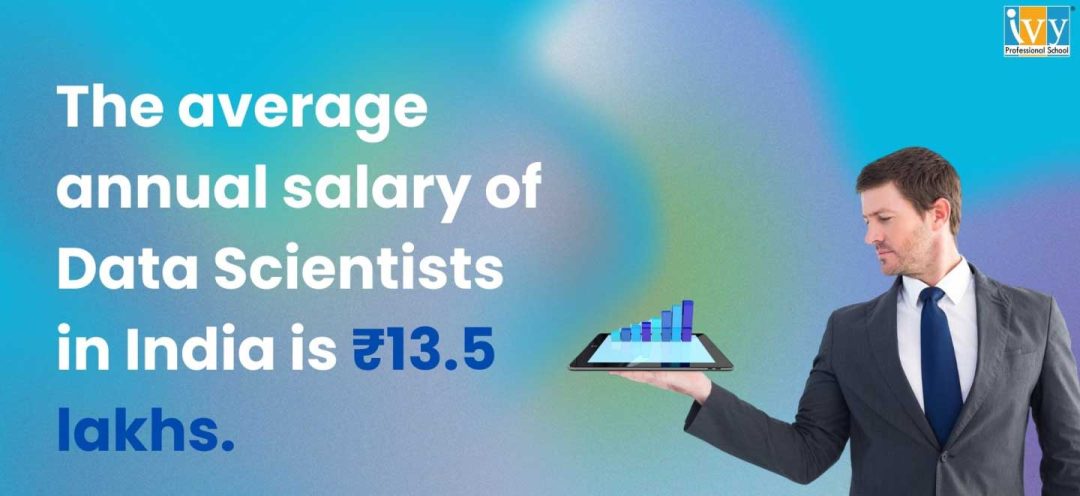
Here are some of the key factors influencing how much data scientists earn in India (there may be exceptions):
Experience: It’s what happens in most jobs – the more experienced you are, the more you are likely to earn. Freshers start at the lower end, while highly experienced data scientists with specialized skills get really handsome paychecks, some even reaching an astounding ₹52 lakhs per year (Glassdoor).
Location: Tech hubs like Bangalore, Mumbai, and Delhi usually offer better salaries compared to smaller cities due to a higher demand for data scientists and a higher cost of living. We will see the average salary of data scientists in those Indian cities in the following sections.
Industry: Some industries, like finance and e-commerce, really value data-driven insights. They’re prepared to pay more for skilled data scientists. For instance, the average annual salary of data scientists in financial services in India is ₹15.3 Lakhs (AmbitionBox).
Company Size: Generally, big-name companies and multinational corporations offer more competitive salaries and benefits packages than smaller startups. For instance, a data scientist at IBM earns an average base salary of ₹14.5 lakhs per year (Glassdoor).
So, now you realize data scientists really make big money. But there is a reason why they are paid so much. Actually, if you want to enter this field, you will be more motivated by the impact you create than the money you make. This brings us to the next section:
Here are the primary reasons why data science is one of the top 10 highest-paying jobs in the world:
Businesses Need to Understand Data: By 2025, it’s estimated the world will create roughly 463 exabytes of data daily. Businesses collect these datasets, which can be about customer behavior, market trends, machines, etc., to find valuable insights. But that data means nothing unless they can understand it. Data scientists have the skills to transform raw data into actionable insights that help companies make better decisions.
Data Scientists have Unique Skill Set: Data science is a mix of technical and business skills. Data scientists need to know not only statistics and programming but also problem-solving and communication. They also need to understand business problems and how to translate data into solutions. That’s what makes them valuable.
High Demand, Low Supply: There’s a lot more data out there than data scientists can handle. Businesses across industries are eager to find data-driven insights, but finding qualified data scientists remains a challenge. Businesses have to utilize data to survive in the market, or their competitors will win. This necessity and shortage of good data scientists drive up salaries as companies compete for top talents.
So, the thing is, companies need good data scientists. Because they rely on data-driven insights to optimize pricing, target advertising, predict customer churn, streamline logistics, and perform countless other business processes. That’s why they are willing to pay so much to skilled professionals. Now, let’s move on to the next section…
Here are some of the Indian cities that pay data scientists the most with the average salary they offer. This will help you choose the right city for jobs and make your career a fulfilling journey.

Delhi has tons of jobs for data scientists, including various sub-domains like ML, AI, and data analytics. You will find big companies, new startups, and even government projects that need skilled professionals. The average salary of data scientists in Delhi is ₹15 lakhs per year. Apart from this, you will love the delicious street food and local markets like Chandni Chowk and Sarojini Nagar.
One of the most rapidly developing cities, Gurgaon, is a favorable environment for data scientists with a significant number of job opportunities. Many multinational companies and international startups have offices there, so you will find good jobs with good pay. It’s modern and close to everything Delhi has to offer. And the average salary of data scientists in Gurgaon is ₹17 lakhs per year.
Mumbai offers a vibrant landscape for data scientists. There are multinational companies, tech firms, and startups with new data scientist positions being added daily. It’s a busy, exciting city where you can meet ambitious people. The average salary of data scientists in Mumbai is ₹16.5 lakhs per year. And in this city of dreams, you will like to spend peaceful time near the beaches and have luxurious dinners in 5-star restaurants.
Bangalore is a hotspot for data science professionals, with over 39,000 data scientist jobs. These job openings are for various domains within data science, like junior data scientists, Python developers, machine learning engineers, and data science specialists. The average salary of data scientists in Bangalore is ₹17 lakhs per year. The city offers a professional environment, with most people working in corporations. And you are certainly going to love the pleasant weather here.
Hyderabad offers thousands of data scientist jobs, with new job openings being added regularly. There are big companies and smaller startups, so you have choices of where you want to work. The average salary of data scientists in Hyderabad is ₹12 lakhs per year. It’s a more relaxed city than some of the biggest ones, so you can expect a peaceful time here. And did we mention the delicious Hyderabadi biryani?
Now that you know the data scientist’s salary in India, you must be feeling excited to enter this field.
So, if you want to learn and become a skilled data scientist, you can join Ivy Pro School’s Data Science and AI Certification course in partnership with E&ICT Academy IIT Guwahati.
This course teaches you all the industry-relevant skills like ML, AI, Cloud, Gen AI, Data Analytics, Data Visualization, etc., with tools like Adv Excel, SQL, Python, Power BI, VBA, Tensorflow, etc.
In this 45 weeks of training, you will be coached by professors from IIT and experts from Amazon, Google, Microsoft, etc, making you ready for high-paying data science jobs.
Visit this page to learn more about Ivy’s Data Science and AI Certification course.
Team Apr 23, 2024 No Comments

Data science is a very attractive career choice now. It offers excellent salaries, incredible work satisfaction, good job security, and a chance to make this world a better place.
No wonder the Bureau of Labor Statistics projects 35.2% employment growth for data scientists between 2022 and 2032.
If you want to enter this thriving field, the beginning steps can be confusing. What should you learn? What’s the syllabus of data science courses? What subjects do you need to master? All these are common questions you may have.
This blog post is here to help. We will share an updated data science course syllabus and subjects, giving you a roadmap to success. But first, let’s understand the role of data scientists and why they matter so much.
Data scientists basically find hidden patterns and insights in raw data. This helps businesses avoid guesswork and make informed decisions.
A McKinsey study found that data-driven companies are 23 times more likely to acquire customers, 6 times as likely to retain them, and 19 times as likely to be profitable. This shows why businesses are dying to hire good data scientists.
Data scientists also help businesses understand why a certain thing happened and predict what might happen in the future.
For instance, if a business finds its sales are dropping, a data scientist can help understand the cause behind it. To do this, they collect relevant data like sales numbers, website visits, customer surveys, etc. Then, they clean the data to make it organized.
Next, they use data analytics tools to analyze the data and find insights. They also use Machine Learning to examine massive data sets automatically, without any human involvement.
Finally, they communicate their findings to the business’s decision-makers. The insights help companies make better decisions about where to invest their money, what upgrades to launch, how to improve customer service, etc.
Now that you know what data scientists actually do, let’s see what data science subjects you have to study to become one.

Before we get into the syllabus of data science, let’s discuss some essential subjects you must study to become a skilled data scientist:
Databases and Big Data: In data science, you deal with massive amounts of data sets. So, you should know how to manage and process those large datasets. So here you learn databases (using SQL) and big data technologies like Hadoop and Spark.
Data Wrangling and Exploration: Real-world data is unorganized. Data wrangling helps you learn the process of cleaning and organizing data into a usable format. At the same time, data exploration involves studying the data and looking for initial patterns and relationships that might point toward deeper insights.
Data Analysis: Here, you learn how to carefully examine data to find meaningful information to support better decision-making. This is important because raw data is meaningless. Data analytics helps in extracting meaning from it and supports businesses, innovations, scientific research, etc.
Data Visualization: Numbers are boring and difficult to understand. That’s why here you learn how to use charts, graphs, and other visual tools to clearly communicate what you find in data analysis. It helps you tell stories and make complex information easier to understand.
Mathematics: This is the foundational subject in the entire data science syllabus. You will need a strong understanding of statistics, probability, linear algebra, calculus, etc. Statistics provides the tools to understand, analyze, and interpret data correctly. Linear algebra and calculus are important for developing and understanding the algorithms and models used in the field.
Programming: Data scientists use programming languages to implement everything they do. Python and R are the most popular languages you have to learn. This will help you write code to collect data, clean it, perform analyses, visualize data, build machine learning models, etc.
Machine Learning: This is an interesting thing to study. Here, you learn how to train computers to learn from data without being manually programmed. Machine learning includes various algorithms and methods that allow computers to find patterns, make predictions, and even take actions based on the data they are given.
Deep Learning: This is a subset of machine learning. Here, you learn about artificial neural networks that help in finding complex patterns from massive datasets. Deep learning has amazing applications, like computer vision, that enable image recognition for self-driving cars. It’s also found in AI chatbots and language models like ChatGPT.
Generative AI: Gen AI is the revolutionary AI model that can generate text, images, code, audio, and other types of data. It helps humans be more creative and automate repetitive processes. Here, you will learn about Generative Adversarial Networks (GANs), their applications, and how to build them using programming languages like Python.
The following data science course syllabus has been updated to meet current industry requirements. It takes you from the basics of data science to advanced concepts, teaching you all the in-demand tools you will need to solve real-world business problems.
This same syllabus is taught in Ivy Pro School’s Data Science and AI course with IIT Guwahati. This 45-week course also involves concrete projects to help you gain hands-on experience. So here we go…
The above data science course syllabus is strictly followed by Ivy Pro School’s Data Science and AI certification course. The course helps you learn industry-relevant skills, build a solid portfolio, and become job-ready in just 45 weeks.
This course is made in partnership with E&ICT Academy IIT Guwahati, where you are directly taught by professors on the IIT Guwahati campus. Besides, the IIT brand on your certificate gives you credibility and helps you stand out in interviews.
The online classes with live doubt-clearing sessions help you complete 50+ projects using industry-standard tools like SQL, Python, Keras, Tensorflow, OpenCV, Power BI, and Tableau. This is how you build an impressive portfolio that demonstrates your skills to employers.
Visit this page to learn more about Ivy’s IIT-certified Data Science and AI Certification course.
Team Apr 19, 2024 No Comments

Updated on 23rd August, 2024
Choosing a career option after graduation can feel overwhelming. There are so many options, and it’s natural to feel unsure about the best path.
The good news is that the 2024 job market is thriving, with opportunities in both traditional and unconventional careers. You just have to find a path that aligns with your interests and skills, and it will give you both financial stability and a sense of fulfillment.
This blog post shares the 5 best career options after graduation in 2024. This will help you clear the confusion, get on the right track, and build a rewarding future.
A good career lets you solve real-world problems, helps you make good money, satisfies your soul, and challenges you to grow. But with so many options, it can be difficult to know where to start. So here are some of the best career opportunities after graduation you can try:
This career option is now trending worldwide. Businesses across industries are looking for expert data scientists to transform raw data into valuable insights.
Data scientists use advanced analytics tools, programming, and problem-solving skills to uncover patterns in raw data, predict trends, and help businesses make informed decisions.
No wonder data science is a fulfilling career that offers impressive salaries and helps you make a real-world impact. In fact, the average salary of a data scientist in India is an astounding ₹12,00,000.
To become a data scientist, you may require a B.Tech degree or a bachelor’s degree in Mathematics, Statistics, or Computer Science. Many companies favor candidates with master’s degrees in data science or related fields, although strong skills and a good portfolio can open doors.
You can join Ivy Pro School’s Data Science and AI course with IIT Guwahati to learn Data Science from scratch, complete real-world projects, and land high-paying jobs in MNCs.
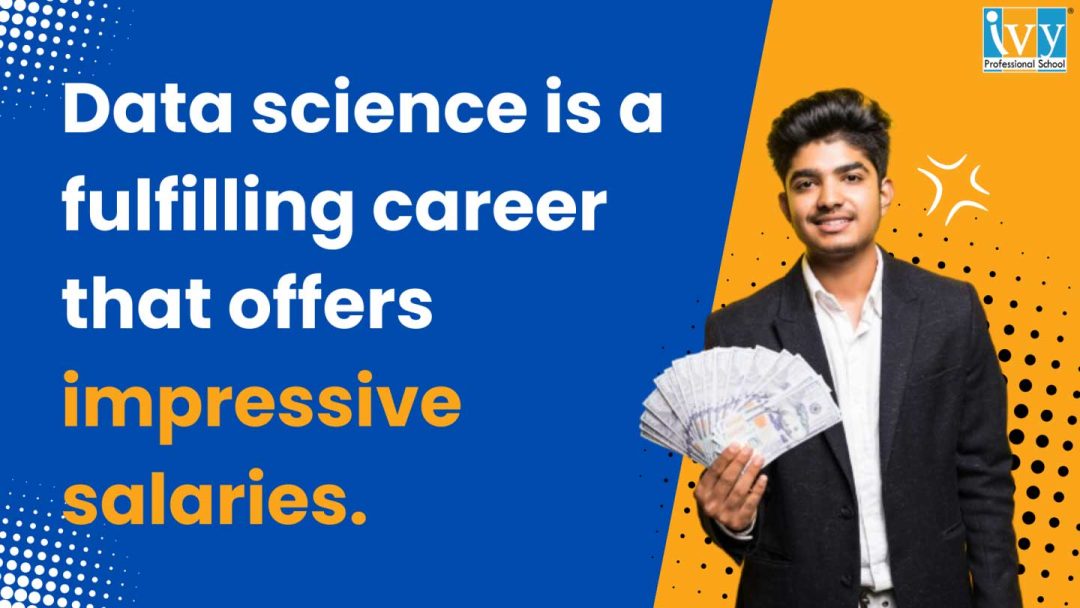
If you want a career option after graduation that doesn’t involve working 9-5, content creation can be a good choice.
As a creator, you make content on digital platforms to build an audience. The content could be videos on YouTube, reels on Instagram, blog posts on your website, stories on Medium, or written posts on LinkedIn and Twitter.
You basically have to talk about things you are passionate about. At the same time, the content should provide value to the audience, either by entertaining, educating, or inspiring them.
Content creation lets you be your own boss. You can be creative, talk about things you like, and make a positive impact on the world.
Also, you can make good money from ads and sponsorship opportunities and even sell your products. In fact, 52% of creators earn $50K-$100K per year by spending 10 hours or less per week on content creation.
However, content creation isn’t as easy as it sounds. You have to learn skills like writing, video production, storytelling, content marketing, etc. You have to consistently create content, remain updated with the world, and keep yourself positive even when things don’t work for you.
This needs no introduction. You already know how reputed a career in civil services can be. Frankly, almost every graduate thinks of becoming an IAS, IPS, or IRS at least once in their college life.
A career in civil service gives you everything you can think of- job security, good salary, job satisfaction, recognition, opportunity to serve the country.
Civil servants are the backbone of the country’s administration. They shape policies, manage public resources, and directly impact the lives of millions. A career in civil services lets you serve your country and make a tangible impact on society.
Now here comes the bitter truth: the path to becoming a civil servant is really difficult. You have to clear the highly competitive UPSC Civil Services Examination, one of the toughest examinations in the world. The extensive syllabus, subjective exams, and unpredictable question patterns make it difficult.
But if you are a hard worker with perseverance and a passion to serve the country, you may succeed and become a civil servant.
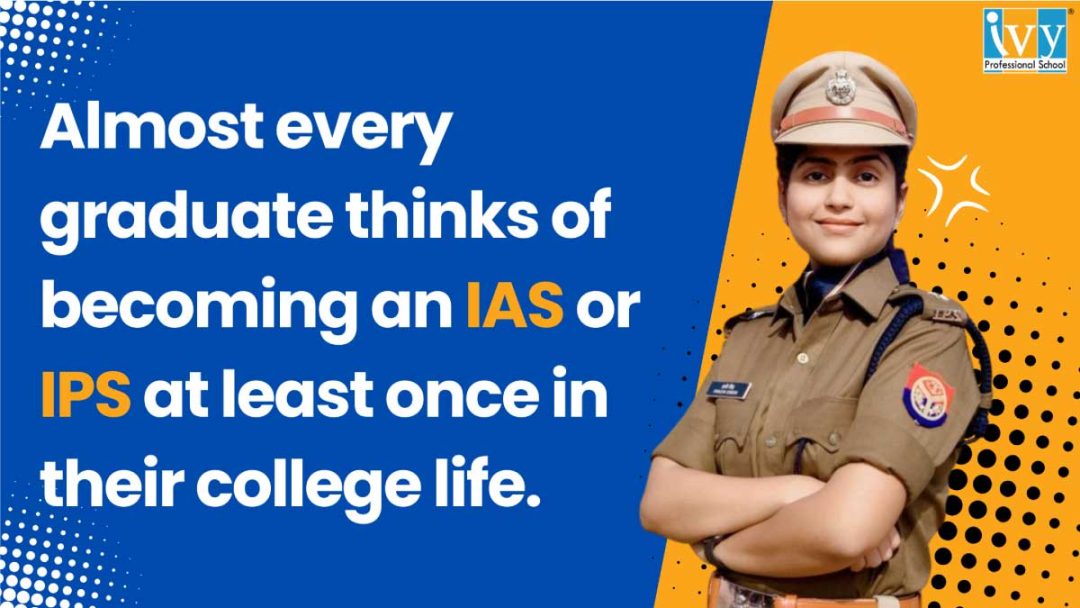
Software engineers make apps and websites we use daily. They write the code to transform ideas into functional software that solves real-world problems.
Software engineering is all about mastering programming languages like Python, Java, C++, or HTML. You will work on various stages of the development process, from coding to testing and deployment. You will also work in teams and bring big projects to life.
Since technology constantly evolves, this field lets you learn new things and face exciting new challenges. You can do a full-time job or work as a freelancer, depending on your choice. The growing demand for skilled software engineers means you will have job security and competitive salaries.
If you have a logical mind, enjoy creating something from scratch, and love technology, software development could be an incredibly rewarding path.
If you are looking for a unique career option after graduation, you can start your one-person business. This could be a good path if you like to take risks and explore different interests.
This career option lets you build products and services to help people. You can be a freelance writer, graphic designer, or website developer to sell your services. Or you can start your ecommerce store. Or you can create online courses based on your expertise. Or you can be a personal trainer and help people get fit. There are numerous ways to do it.
But whatever you choose, a one-person business gives you the ultimate freedom and flexibility. You set your hours, choose your clients or products, and pursue your passions directly. And now, using AI, you can do multiple things and boost your one-person business.
To build a successful one-person business, you have to create really good products and services. Besides, you need certain skills (writing, design, marketing, selling), an entrepreneurial mindset, a desire to work hard, and strong self-discipline. The initial months can be difficult, but when you do it consistently for a long time, you will get incredible rewards.
Now you know what the best career options after graduation are. So, if you are interested in technology and mathematics, you can choose to pursue a career in data science and AI.
Ivy Pro School’s Data Science and AI certification course with IIT Guwahati can be a good starting point.
This is an online class with live doubt-clearing sessions. You will be taught by professors from IIT and experts from companies like Amazon, Google, Microsoft, etc.
This 45-week training teaches you in-demand skills like Data analytics, ML, and Gen AI with tools like Adv Excel, SQL, Python, Power BI, and Tensorflow.
Since 2008, Ivy has trained 29,000+ graduates working in over 400 organizations. If you want to be the next one, visit this page to learn more about the Data Science and AI course.
Which careers have the highest scope in the future?
Careers with the highest scope are mostly related to technology and management. They include data scientists, AI and ML engineers, software developers, project managers, etc. The global AI market is expected to reach USD 1,345.2 billion by 2030, and the data science market is expected to reach USD 776.86 billion by 2032. This means there will be many more jobs in these fields.
Which skills are the best after graduation?
Technical skills like data science, programming, generative AI, and digital marketing are some of the best you can learn after graduation. Soft skills like communication, public speaking, negotiation, leadership, problem-solving, time management, and creative thinking can also help you a lot in your career.
What are some unique career options after graduation?
AI and ML engineering, data storytelling, ethical hacking, content creation, podcasting, life coaching, and freelancing are some unique career options after graduation. But before you choose a career, make sure you are interested and enthusiastic about it, because you will be doing it for the rest of your life.
What are the best career options after graduation in science?
An MBA, data science, machine learning, programming, research scientist, and professor are some of the best career options after graduation in science. These are just a few examples, you can conduct further research to figure out a career based on your interests and skills.
What courses can I take after graduating with a commerce degree?
Business analysis, financial analysis, data science, an MBA, accounting, and banking are some of the courses you can take after graduation in commerce. They can help you learn in-demand skills and get high-paying jobs to achieve your career goals. At Ivy Pro, we can help you become a skilled data scientist or business analyst with our comprehensive live online courses taught by experts.

Eeshani Agrawal holds an MS in Civil Engineering from Texas A&M University (USA) and has over 16 years of experience in data visualization, storytelling, and analytics. She has consulted for top engineering, manufacturing, and consulting firms worldwide and has coached over 9,000 professionals and students from leading institutions like IITs, IIMs, and ISI.